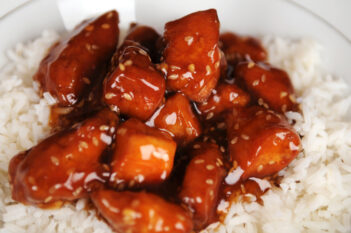
Have you heard anyone claim that they are “allergic” to monosodium glutamate? Or maybe you yourself think you have an MSG allergy. Here I’ll examine the science behind claims of MSG-triggered allergic reactions.
The first report of any type of reaction to MSG was presented in a 1968 letter to the New England Journal of Medicine. Note, this was not research, but rather an anecdotal account of one person’s bodily response following eating at a Chinese restaurant.1 The writer surmised that the reaction (which was characterized as generalized weakness, palpitations and numbness in the arms) may have been due to any number of ingredients in the meal, including sodium, alcohol from Chinese cooking wine, or MSG. This letter was not a condemnation of MSG, but it started the idea that vague reactions such as these might be attributed to monosodium glutamate, as well as started the use of the phrase “Chinese Restaurant Syndrome.” In 1995, the Federation of American Societies for Experimental Biology (FASEB) published a comprehensive analysis of safety of MSG and established a list of symptoms that have been associated with its consumption. The FASEB report also suggested that “MSG Symptom Complex” would be a more appropriate way to describe the alleged symptoms.2
Since that time, there have been many studies (of various quality) conducted to investigate any link between monosodium glutamate and various health conditions and allergy-link symptoms. Despite the fact that “numerous studies have failed to demonstrate that dietary consumption of MSG causes any significant allergic or non-allergic medical problems in the general population,”3 there continue to be people (and medical practitioners) who link the flavor enhancer to allergic-type reactions as well as other “reactions.” Typical symptoms of allergy, such as urticaria (hives/rash) or rhinitis (runny nose/sneezing) have been studied in relation to MSG consumption. According to a review of MSG-allergy research by Williams and Woessner, rigorous, well-controlled, double-blind, placebo-controlled challenges are needed to show definitive links between monosodium glutamate and these symptoms. The authors concluded that “the current evidence does not suggest that MSG is a significant contributor to asthma, urticarial, angio-oedema or rhinitis.”
In another review by Jinap and Hajeb , the authors found that “there is no consistent evidence to suggest that individuals may be uniquely sensitive to glutamate,” and there is no consistent clinical data to support a link between MSG and Chinese Restaurant Syndrome symptoms. Monosodium glutamate is placed in the safest category for food additives by both the Joint Expert Committee on Food Additives of the United Nations Food and Agriculture Organization, and the World Health Organization. What’s more, the U.S. Food and Drug Administration has classified MSG as “generally recognized as safe” since 1959.5
Sensitivities to food are not uncommon and can be caused by a variety of ingredients. In Chinese food, for example, ingredients such as peanut oil, sesame seed or fried egg can cause allergic reactions for some people. This is why it’s important to never self-diagnose. As with any product that may impact your health, it’s always best to consult one’s physician if you’re in doubt about the appropriateness of a food or ingredient for your particular health needs.
- Kwok RHM. Chinese-restaurant syndrome [letter]. N Engl J Med 1968; 278:796.
- Raiten DJ, Talbot JM, Fisher KD, eds. Analysis of adverse reactions to monosodium glutamate (MSG). J Nutr 1995; 125: 2892S–2906S
- Williams AN, Woessner KM. Monosodium glutamate ‘allergy’: menace or myth? Clinical & Experimental Allergy 2009; 39:640-646.
- Jinap S, Hajeb P. Glutamate. Its applications in food and contribution to health. Appetite 2010; 55:1-10.
- Meadows M. MSG: a common flavor enhancer. FDA Consumer 2003; 37:103–4.

